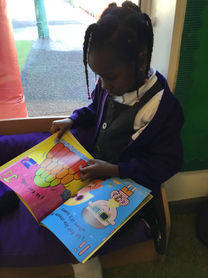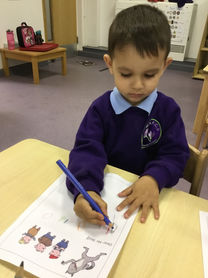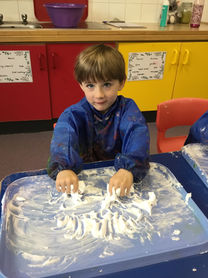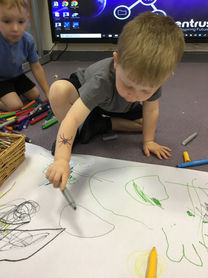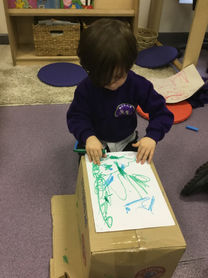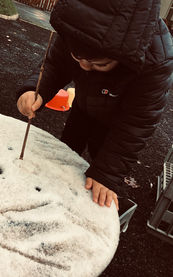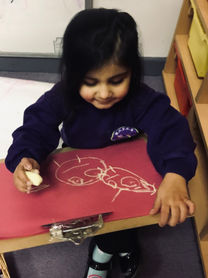
English
Welsh House Farm believes that the development of key skills in reading, writing, speaking and listening are central to improving a child's life chances.
Teachers have high expectations for all children to achieve and enjoy English, model good written and spoken English and provide opportunities for children to use the skills they have acquired in a range of contexts.
Rich texts are at the heart of our teaching and a love for reading is promoted throughout the school via daily guided reading sessions, author visits, storyteller visits, reading competitions, world book day celebrations, book clubs and updating our school library with stimulating and exciting books, newspapers and magazines.
Teachers use inspirational ideas to engage children in work; providing memorable experiences and bringing topics to life. A creative approach to planning units of work using drama, film, trips and hands-on activities is actively encouraged as is a clear purpose and audience, either real or imagined, to launch a unit of work.
We value and celebrate diversity in culture and language, providing rich and relevant texts and topics to include and engage all learners.
Phonics and the Teaching of Reading
"The teaching of reading and phonics is effective. Pupils are developing of love of reading, which is promoted thorough a broad curriculum." 2018 OFSTED report
"Teaching throughout the school promotes an interest in reading. The school is well resourced with reading books, which pupils regularly take home" 2018 OFSTED report
"Teachers are skilled with teaching pupils the phonic skills they need to help them with their reading and writing. Highly effective guided reading lessons take place each day, with well-matched reading books and activities that assist pupils’ progress in reading." 2018 OFSTED report
At Welsh House Farm, we use a systematic synthetic phonics programme called 'Little Wandle letters and Sounds revised' to teach phonics and early reading. The programme begins in Nursery where the children are taught the Foundation for phonics, it continues through Reception and Year One where the children receive daily phonics sessions. In Year Two, any children who need to remain on the programme will receive 'catch up sessions and remain on the programme.
Knowledge and skills in comprehension, prosody, fluency and understanding different texts are taught via guided reading sessions. Children apply these skills in real-life contexts, daily reading sessions and when reading for pleasure. At Welsh House Farm we use reading sessions to expose children to different question types, discuss themes, model prosody and explore and discuss a variety of text types. We value story times and have a time-tabled story session for every class, every day in which we read books from our reading spine as well as promote an array of authors. We invest in books and have a half termly supply of new children's books to supplement our library and book corners to ensure children are exposed to current children's literature. Each classroom has a stimulating book corner with a wide range of text types and all children take a practice book and a book to read for pleasure home..
We celebrate reading by holding a ‘Reading Star’ assembly every half term, engage children and parents in 'Reading Cafe' mornings, book clubs, book displays, reading workshops, World Book Day activities, Bookfest activities, weekly hot chocolate/biscuit and book bags, reading ambassadors and reading challenges.
Writing at Welsh House Farm
"Overall, writing is taught well. Pupils develop the skills they need to improve their writing effectively. They have many opportunities to write at length in different subjects across the curriculum." OFSTED Report 2018
Our main approach to writing is based on ‘Talk for Writing’ (Pie Corbett/Julia Strong) which is a methodology that encourages children to explore, through talk and role play, and develop the thinking and creative processes involved in being a writer. It is embedded at every phase of the teaching sequence which includes teacher talk, supported pupil talk and independent pupil talk and application.
Children are given opportunities to write for a wide range of purposes, not only within specific literacy lessons, but across the curriculum. Children develop their understanding of a range of text types and how to write in a variety of forms. They are encouraged to develop their skills in spelling and handwriting and to redraft and improve their writing.
We celebrate writing by holding a ‘Star Writer’ assembly every half term, and the children’s work is presented for all to see on a ‘Star Writer’ board in the school hall.
English in other curriculum areas
The skills that children develop in English are linked to, and applied in, every subject across the curriculum. The children’s skills in reading, writing, speaking and listening enable them to communicate and express themselves in all areas of their work in school. Children also have regular opportunities to develop their speaking and listening skills in celebratory performances and class assemblies.
We have links to ‘able writer’ and ‘able reader’ workshops led by a company called ‘Language alive’ at another local primary school. The events support our more able writers/readers and enables them to work collaboratively alongside children from other local schools.
SOOPER BOOKS FOR SCHOOLS
We are now part of the Sooper Books Stories For Schools Programme.
Sooper Books the award-winning digital children's story platform, has kindly given our school free access to all pupils between 8am and 5pm Monday to Friday. If you'd like free access during these times please contact Mrs. Justin for the login details. And please do not access the website via the school login outside of these times.
There is a range of fantastic fairy tales, children's stories original poems for kids, contemporary Aesop's Fables and new series content, each with a professional audiobook.
Many thanks to Sooper Books for letting us use their platform during school time.

English Genre Maps
Reading for Pleasure
Reading for Pleasure
At Welsh House Primary School, we know that children who read will do well at school and beyond. We aim to develop a positive attitude towards reading and to foster a love of books through our enthusiastic reading culture. We encourage children to read not only at school, but beyond the school gates too: at home, in the park, on holiday!
Keep Reading!
We really urge you to encourage your child to keep up with all the brilliant reading they have been doing while at school.
There are numerous ways to access books and other reading resources, from your local library and bookshops to online audio books. If you need any ideas for books, there are reading book lists for each age group below.
Downloads
Events
The Children's Book Project Pop Up Book Shop







